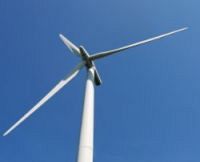

The UK government has announced that it will use planning reforms to cut approval times for new offshore wind farms from four years to one as part of its British Energy Security Strategy.
It sets out how Great Britain will accelerate the deployment of wind, new nuclear, solar and hydrogen power, and build on the Prime Minister's ten point plan, published in November 2020. In the near term it supports the production of domestic oil and gas.
The strategy was published two days after the IPCC published its Sixth Assessment Report, which emphasised that to limit global warming, major transitions in the energy sector will be required, which will involve a "substantial reduction in fossil fuel use, widespread electrification and improved energy efficiency".
The government is seeking to deliver up to 50GW of offshore wind power by 2030, which is "more than enough to power every home in the UK". Of this, the government wants up to 5GW to come from floating offshore wind in deeper seas.
This will be underpinned by new planning reforms that will cut the approval times for new offshore wind farms from four years to one year. There will also be an overall streamlining to "radically reduce" the time it takes for new projects to reach construction stages while improving the environment.
Offshore wind prices have fallen by around 65% since 2015, and despite onshore wind prices reducing by 50% since 2013, consultations will be held on developing partnerships with a "limited number of supportive communities who wish to host new onshore wind infrastructure in return for guaranteed lower energy bills".
The government's ambition is for 28GW to come from nuclear power by 2050, which it describes as "safe, clean and reliable". This would represent around 25% of Britain's projected electricity demand.
If the technology allows, small modular reactors will form part of the nuclear project pipeline and a government body, Great British Nuclear, will be established immediately to bring forward projects. It will be backed by substantial funding and the £120 million Future Nuclear Enabling Fund will be launched this month (April 2022).
The government is committed to progressing work on up to eight reactors, equivalent to one reactor a year instead of one a decade, including Wylfa site in Anglesey.
The strategy aims also include:
Prime Minister Boris Johnson said the strategy will: "reduce our dependence on power sources exposed to volatile international prices we cannot control, so we can enjoy greater energy self-sufficiency with cheaper bills".
Energy secretary Kwasi Kwarteng said: "We have seen record high gas prices around the world. We need to protect ourselves from price spikes in the future by accelerating our move towards cleaner, cheaper, home-grown energy".
"Scaling up cheap renewables and new nuclear, while maximising North Sea production, is the best and only way to ensure our energy independence over the coming years".
Nevertheless Friends of the Earth Scotland's climate and energy campaigner Caroline Rance argued: "By doubling down on oil and gas, they are keeping us locked in an unaffordable and destructive energy system that is only delivering billions in profits for oil companies whilst millions of people are forced to choose between heating and eating".
"Whilst the announcement on growing offshore wind is a positive step, it is fatally undermined by new expanding fossil fuels and commitment to create a toxic legacy for thousands of years from new nuclear power".
For more information on this subject, see: